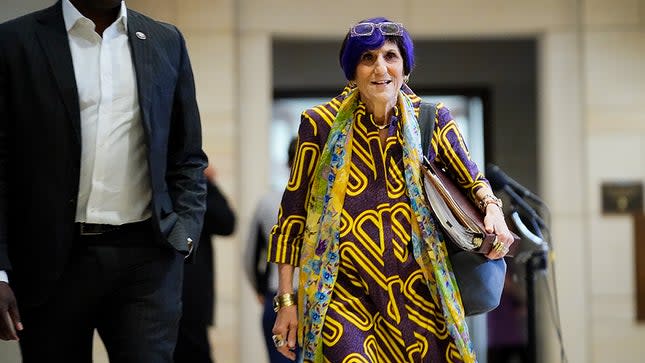On The Money — Congress starts kicking the shutdown can

Happy Monday and welcome to On The Money, your nightly guide to everything affecting your bills, bank account and bottom line. Subscribe here: thehill.com/newsletter-signup.
Today's Big Deal: Lawmakers have introduced a stopgap bill to fund the federal government with a shutdown approaching. We'll also look at a pivotal hearing for cryptocurrency regulation and an airline merger.
But first, Elon Musk is potentially in trouble with the SEC again.
For The Hill, we're Sylvan Lane, Aris Folley and Karl Evers-Hillstrom. Reach us at slane@thehill.com or @SylvanLane, afolley@thehill.com or @ArisFolley and kevers@thehill.com or @KarlMEvers.
Let's get to it.
Short-term government funding bill introduced

House Appropriations Committee Chair Rosa DeLauro (D-Conn.) on Monday introduced a short-term bill that would allow the government to remain funded through March 11 and temporarily stave off a government shutdown.
The legislation comes as top negotiators on Capitol Hill have struggled for months to reach a bipartisan agreement on government funding for fiscal 2022, which began at the start of October.
"Our country needs a government funding agreement to create good-paying jobs, grow opportunity for the middle class, and protect our national security. We are close to reaching a framework government funding agreement, but we will need additional time to complete the legislation in full," DeLauro said in a statement introducing the continuing resolution.
"This Continuing Resolution - the product of bipartisan, bicameral negotiation - extends funding through March 11 to keep [the] government up and running while Congress completes our important work," she added.
Aris has more on the fight to avert a shutdown here.
Read more: Five obstacles lawmakers face in reaching an omnibus deal
ON THE HILL
Lawmakers to scrutinize 'stablecoins'
A House committee is set to debate how far the federal government should go to supervise, regulate and allow the offering of "stablecoins" - cryptocurrency tokens tied to a fixed value.
In a Tuesday hearing, members of the House Financial Services Committee and Treasury Undersecretary Nellie Liang are expected to draw lines around the ways Washington should address a rapidly growing segment of the cryptocurrency industry.
Stablecoins have exploded in popularity and prominence among digital currencies, drawing both excitement and concern from policymakers.
While the values of other cryptocurrencies such as Bitcoin and Ethereum are volatile, stablecoins offer tokens redeemable for a specific price, usually in U.S. dollars.
With close to $180 billion in stablecoins in circulation, policymakers are racing to set up a basic framework for which companies are allowed to offer stablecoins, transparency rules for stablecoin issuers and whether stablecoin offers should be subject to federal stress testing.
Sylvan tells us what to expect here.
MEGA-MERGER
Frontier, Spirit merger likely to draw DOJ scrutiny
The proposed merger between Frontier Airlines and Spirit Airlines announced Monday is likely to draw scrutiny from the Biden administration, which has sought to crack down on mega-mergers and frequently bemoans the domination of the airline industry by a handful of companies.
The budget carriers are making the case that the $6.6 billion deal will allow the newly formed company to take on the four big airlines that service most U.S. flights, providing more consumers with cheaper options. But they will need to convince the Biden administration.
Experts say that while a merger between two budget carriers may have been a slam dunk under previous presidents, the airlines should expect tough sledding from Biden administration officials who have taken a hard line on corporate consolidation.
That's because Biden's DOJ previously filed a lawsuit to block an alliance between American Airlines and JetBlue that was also billed as being pro-competition.
All eyes are on Assistant Attorney General Jonathan Kanter, an outspoken critic of mega-mergers who said last month that the DOJ will challenge any merger that "substantially" lessens competition.
Together, Frontier and Spirit would form the nation's fifth-largest carrier by seat capacity and the seventh-largest by revenue. The airlines said that the merger will save them $1 billion annually, extra cash they will use to expand their routes and hire an additional 10,000 workers by 2026.
Karl has more here.
FACIAL RECOGNITION
IRS to drop facial recognition verification service
The Treasury Department is moving away from the controversial verification software ID.me amid concern over the company's use of facial recognition technology.
The IRS had announced last year that it would start requiring people who file taxes online to register with ID.me, which would verify the identity of filers with a video selfie. The program was supposed to be rolled out this summer for all IRS services, including making online payments and accessing tax credits.
Critics have been sounding the alarm over ID.me's use, warning that giving a private company access to that much biometric information is inherently risky and pointing out that many facial recognition systems have deep racial and gender biases.
The latter concern has been amplified since CEO Blake Hall admitted the company uses technology that matches faces against a larger database rather than just other images of the same face.
Several lawmakers from both sides of the aisle have spoken out about the issue, including Sen. Ron Wyden (D-Ore.), who revealed the Treasury Department's plans to drop ID.me.
Read more here from The Hill's Chris Mills Rodrigo.
Good to Know

John Boyd Jr., a civil rights advocate and fourth-generation farmer, has a message to share as he fights for farmers of color to receive billions in coronavirus relief funds held up by white farmers alleging discrimination.
"I'm not going away," Boyd says.
Almost a year has passed since the government approved the aid as part of the $1.9 trillion coronavirus relief package President Biden signed in March. But the minority farmers the money was intended to help have been shut out from receiving the relief as it remains tied up in court battles.
Read our profile on Boyd here.
Here's what else we have our eye on:
First lady Jill Biden confirmed that the administration won't be able to deliver free community college to Americans, acknowledging that a major provision of President Biden's economic agenda is off the table.
The Swedish price comparison site PriceRunner on Monday filed a lawsuit accusing Google of manipulating search results to favor its own shopping service.
The U.S. Department of Agriculture (USDA) will invest up to $1 billion in pilot projects that reduce planet-warming emissions or store carbon to prevent them from being released into the air.
That's it for today. Thanks for reading and check out The Hill's Finance page for the latest news and coverage. We'll see you Tuesday.

